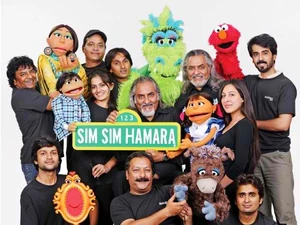
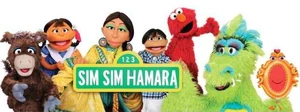
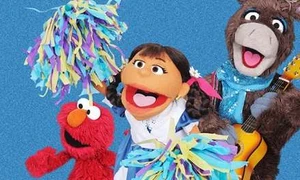
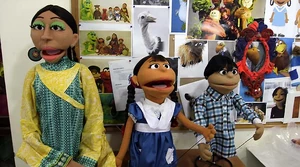
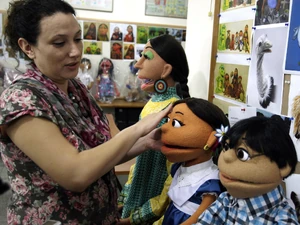
Sim Sim Hamara (Our Street) is an Urdu-language Pakistani-coproduction of Sesame Street, first aired November 26, 2011.
The series is co-produced with Sesame Workshop and the Rafi Peer Cultural Centre. It is funded by the United States Agency for International Development (USAID).
USAID would have fund 72 half-hour episodes over four seasons. Of the episodes, 52 were to be dubbed for broadcast on regional television channels throughout the country, in Sindhi, Punjabi, Balochi, and Pashto. Some content will be broadcast on the radio; this program will also directly target mothers.
Previously the country aired Bert and Ernie's Great Adventures on Turner Entertainment Network Asia.
Earlier, the show was to be named Gali, Gali Hamara (roughly Every Street, Ours). Filming was to begin in March 2011, on air on national broadcaster PTV by July; as of April filming began in the summer, airing in the autumn.
On June 5, 2012, it was announced that the show was cancelled due to financial problems from the USAID.
Characters
The series featured 14 characters, only two of which aren't Pakistani.
- Rani (alternatively spelled Ranni), a six-year-old girl with braided hair, and a passion for school, she is the captain of her school cricket team and a budding harmonium player,
- Munna, a five-year-old boy, obsessed with numbers and tabla, Pakistani drums,
- Haseen O Jameel, a vain, trouble-making crocodile,
- Elmo, from Sesame Street
- Baaji, a "spirited adult woman"
- Baily, a hard working donkey, who wants to be a pop star
- Aiena, Hanseen O Jameel's Mirror
Outreach
Among the outreach, there were plans for open-air Hamara-themed festivals in 30 large cities and 150 rural villages. In total,
- 600 live productions
- 600 mobile screenings
- 30 educational school fairs
- an interactive website
In addition, "the project will work to include out-of-school children in various educational activities," according to USAID.
Pre-production
From October 20 to 21, 2010, over 50 education and media experts from Pakistan gathered in Islamabad, to develop content for the "Pakistan Children's Television Project". The sessions, in accordance with the 2009 Pakistan National Education Policy, was for those aged 4 to 9.
After the session, the episode commission was revised from 78 episodes to 72, and the minimum target age from 4 to 5. By late October 2011, the number of episodes had returned to 78, with 52 episodes filmed in alternate languages. There were 130 radio episodes in 5 languages, as well.
Rafi Peer Cultural Centre
The Rafi Peer Cultural Centre was one of 300 agencies that bid for the contract from USAID, to co-produce with Sesame Workshop. Founded in 1974, and named after Rafi Peerzada, it is the country's oldest performing arts company.
In 1992, 1994, 1996, and 1998, the Pakistan International Puppet Festival was organized by the Rafi Peer Theatre Workshop. They were also influential in setting up the Union International de la Marionnette in Pakistan in 1993. At one point, the organization was working towards a Museum of Puppetry in Lahore. Co-founder Faizaan Peerzada has personally built over 1500 puppets in his career.
The organization has seen its share of trouble. Their events have been attacked in the past, including a 2008 world arts festival; a half-dozen died in three small bomb blasts.
See also
- Galli Galli Sim Sim, the phonetically similar Indian co-production
External links
- Rick Westhead, "Washington funds Pakistani Sesame Street", The Toronto Star, January 28, 2011.
- Sebastian Abbot, "US ends funding for Pakistan's 'Sesame Street'", Yahoo! News, June 5, 2012.
- Raffi Peer Theatrical Workshop (offline)